These South Asian Artists Want
Palestinian Liberation
And They’re Not Being Quiet
About It
For Babneet Paul Lakhesar (also known as Babbu the Painter) and these other South Asian artists, embracing solidarity with the Palestinians was instinctive.
RefaatAlareerseemed resigned to his fate when he wrote “If I Must Die,” the last poem he would publish, on Nov. 1.
“If I must die / you must live / to tell my story,” the first lines read.
The renowned Palestinian professor, activist and poet was killed along with his family just a month later in an Israeli airstrike in northern Gaza.
Alareer was one of more than 22,000 Palestinians who have been killed by Israeli forces since Hamas’ Oct. 7 attack in southern Israel, when militants killed 1,200 people and took 240 hostages. The violence toward both civilians and combatants rages on, with far more dire repercussions for the Palestinians.
Those who remain in Gaza face agonizing existences. The Israeli government has blocked resources entering the region, resulting in starvation. They’ve also imposed communications blackouts and forcibly displaced 90% of Palestinians from their homes. Horrifying evidence of war crimes has emerged in recent months. Journalists and storytellers on the ground in Gaza, such as Bisan Owda and Motaz Azaiza, have been using social media to document these atrocities for the world to see.
As news spreads, allies outside the Palestinian territories have been expressing their solidarity as well. “For Refaat, we must be louder than ever and make sure the focus returns to what is actually happening in real time to those on the ground,” Canadian poet Rupi Kaur wrote in a tribute to Alareer on Instagram. “Because theirs are the lives we can still save.”
Kaur, whose family is from the Punjab state of India, is one of several South Asian artists using their platforms to raise awareness. Other South Asians, including poets, writers, comedians and painters, have called for a permanent end to the violence, setting up fundraisers toward humanitarian efforts and more.
Their voices and work are more important than ever, especially in encouraging others in the community to speak up, since many remain hesitant to “choose a side.” There are myriad reasons behind this. Some are cultural, like fear of career repercussions, pressures of the model minority myth and internalized Islamophobia. But regardless of the reasoning, it’s critical for South Asians globally to dismantle biases that prevent us from speaking up. The silence makes us complicit.
Artists have always been at the forefront of social and political issues, centering liberation and creating spaces for audiences to engage with them. As it becomes more vital to recognize Palestinians’ decades-long resistance to oppression, these South Asian artists are using their crafts — in addition to boycotting, calling representatives, engaging in protests and more — to help us process it. These writers, visual artists and literary virtuosos are masters of blending culture and activism, and they exemplify just how art is a reflection of our humanity.
Rupi Kaur
Poet Rupi Kaur at the "To Kill a Tiger" documentary premiere on Oct. 19 at the Metrograph in New York City.
Whether you’re into Kaur and her poetry or not, there’s no denying that the 31-year-old’s work has always focused on the resilience of humanity. And she continues to embed that ethos in her advocacy. During the last few months, she has been writingpoems, sharingupdates and imploring her 4.6 million Instagram followers to take action. Perhaps most notably, she shared that she declined an invitation to the White House’s annual Diwali party days after the House of Representatives passed a resolution to fund $14.5 billion in military aid to Israel.
“When a government’s actions dehumanize people anywhere, it is our moral imperative to call for Justice,” she wrote. “Demand a humanitarian ceasefire. Sign petitions. Attend protests. Boycott. Call your reps and say — stop the genocide.”
No Nazar’s Bianca Maieli and Omar Ahmed
The DJ collective No Nazar at a show in New York City.
No Nazar’s mission to unite communities and cultures through music might seem simple, but the DJ collective wields an unmatched artistry that expands its listeners’ worldviews sonically. It meshes South Asian sounds with genres from Afrobeats to baile funk. For Bianca Maieli, 34, and Omar Ahmed, 29, the troupe’s co-founders, it was crucial to use their music and platform to show solidarity with Palestinians.
The group hosted two fundraiser DJ sets in November, one in Los Angeles and one in New York City, spotlighting a roster of Palestinian music and sounds. Part of the proceeds from the shows went to Palestine Legal, a nonprofit that protects those in the U.S. who have been targeted for speaking out for the Palestinians.
The decision to host the events wasn’t easy. They grappled with the idea of hosting events while a humanitarian crisis looms.
“It was challenging to follow through hosting the show because of all the emotions I was feeling — rage, sadness, guilt,” Ahmed said. “The question of ‘Why are we doing this?’ kept coming up in my head.”
After conversations, they decided to go through with it, with the intention of creating a physical space for people to engage with the cause and connect with others who share their feelings.
“Dance and music are linked so much to protest and politics,” Maieli said. “So we wanted to approach it from that lens in the most respectful way possible while using our artistry to hopefully make a change, if not bring awareness or uplift the community.”
“People don’t realize that their single voice, combined with a billion other single voices, make up a massive collective consciousness,” Ahmed said.
Babbu the Painter
As a Punjabi Sikh, Lakhesar says she feels a connection with the pain and plight of Palestinians.
Everything about visual artist Babneet Paul Lakhesar, 30, is unapologetic: her work, bold and bright portraits of femininity, and her advocacy, firmly rooted in her belief in humanity.
Embracing solidarity with Palestinians, then, was instinctive. As a Punjabi Sikh, Lakhesar, also known as Babbu the Painter, understood the pains and plights of Palestinians, with generations of her family and community afflicted by both the India and Pakistan Partition violence and the 1984 Sikh genocide.
The artist released a #FreePalestine art series: vases patterned with the black-and-white keffiyeh, a symbol of Palestinian solidarity, as well as prints and stickers depicting a young girl wearing a keffiyeh with fireworks in her eyes. “The whole idea behind the painting was there’s a young woman who’s looking up, and the sky is not going to be bombed one day,” Lakhesar said.
Lakhesar isn’t concerned about how her audience responds to her activism and work. “I am on a path where I want to be authentic to who I am,” she says. “And if that does not resonate with you, then maybe I’m not the artist that you’re looking for.”
Abby Govindan
"I would much rather be on the right side of history than staying silent out of fear of alienating anyone," Abby Govindan (at right) said.
You may have seen Abby Govindan, 26, going viral on X (formerly Twitter) every other day for her very real and hilarious observations on the world. True to her signature honesty and outspokenness, the comedian has been vocal about her support for Palestinians over the years.
Govindan says she personally chooses to not make jokes about Israel or the Palestinians because she doesn’t have the lived experience. But she’s a firm believer that “the onus should be on the rest of us to show the oppressors that we outnumber them.”
In October, Govindan hosted a sold-out fundraiser comedy event in New York City with fellow comedian Mohanad Elshieky. Part of the proceeds went to the Palestine Children’s Relief Fund, which provides medical and humanitarian aid to children in the Palestinian territories and in the Middle East at large.
“People in NYC are so hungry for a political safe space where we can commiserate (and even make jokes about!) our desire for a Free Palestine far away from the islamophobia and anti-semitism that is so rife in many many other comedy spaces,” she wrote on Instagram.
Govindan says she’s lost brand deals and followers because of her stance, but that if it means upholding her belief system and demanding a foundational level of humanity and empathy for the oppressed, it’s worth it.
“I would much rather be on the right side of history than staying silent out of fear of alienating anyone,” she said.
Batool
"It is important to me to stand up for those who are facing injustices, because my poetry is rooted in my identities," Batool says.
For Batool, who asked not to be identified by her full name in this story, protesting the treatment of Palestinians was no question. From a young age, the creative writer and poet has been instilled with a passion for bettering humanity, through her faith and identity as an American Pakistani Shia Muslim and through her family. Her father leads a nonprofit that provides humanitarian aid and health care across the globe.
“It is important to me to stand up for those who are facing injustices because my poetry is rooted in my identities,” she said. “My religion and my culture provide me with the toolbox; poetry, to speak up and teach me the necessity to advocate and protest.”
Writing is both how Batool processes the harrowing images coming from Gaza and how she calls for an end to the violence. She also looks to Palestinian poets and essayists — Alareer, Mosab Abu Toha, Hiba Abu Nada, Hala Alyan and others — to rekindle her advocacy for Palestinians.
“I am protesting because it is the right thing to do, because I am human, because there is no other option,” the writer said. “Humanity exists in each heart that beats for change, in each cry that echoes the calls for a cease-fire and a permanent, peaceful solution.”
Hazem Asif
Hazem Asif's work imagines the liberation of Palestine.
The worlds that Hazem Asif, 30, illustrates are fantastical and retro — and those qualities are what makes him a powerful artist and activist. His work acknowledges solemn political and social realities while visualizing a vibrant optimism for a just future. On Palestine, his work dreams of its liberation.
“With my artworks, I hope to express my voice and frustrations towards the silent dominant world powers and oppressors,” he said. “I perceive art not just to craft beauty but as a peace-driven instrument capable of sparking change, inspiring and educating the new generation to advocate for what is just.”
Asif’s influence is global; his illustrations have been used on protest posters and shared widely across social media. He has also collaborated with Palestinian American apparel brand Paliroots, with proceeds going toward humanitarian aid in Gaza.
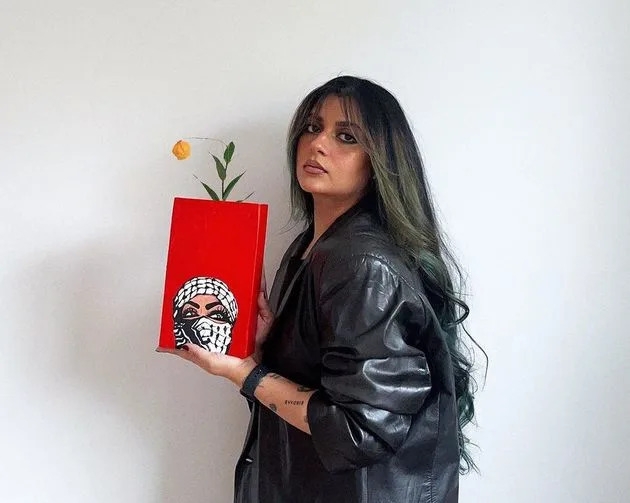
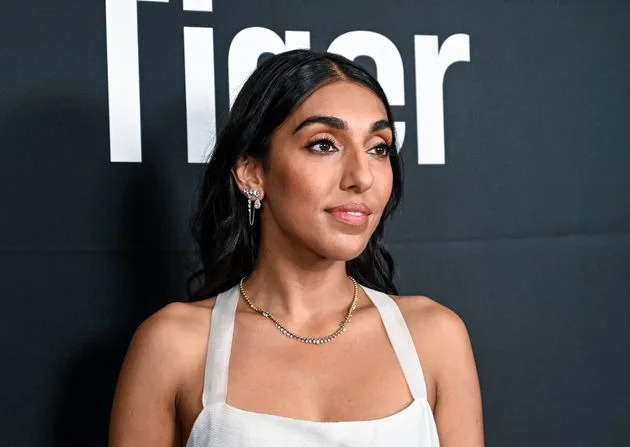
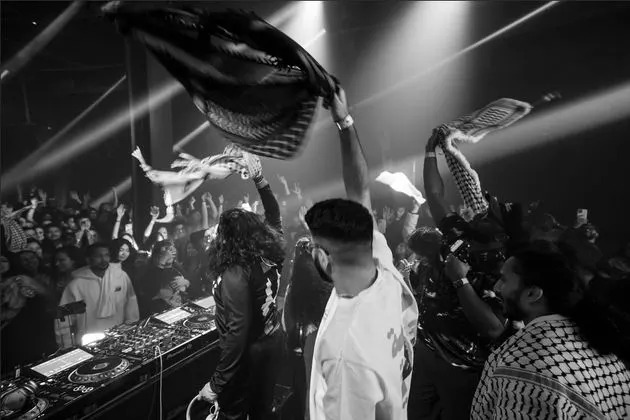
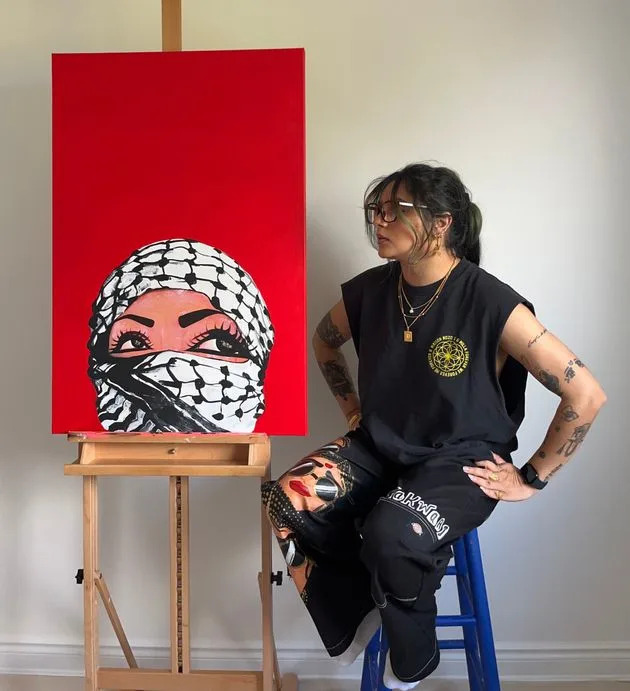


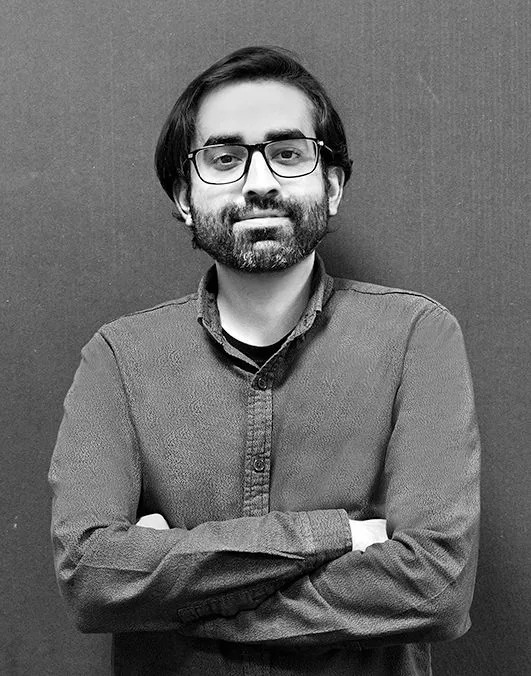
No comments:
Post a Comment